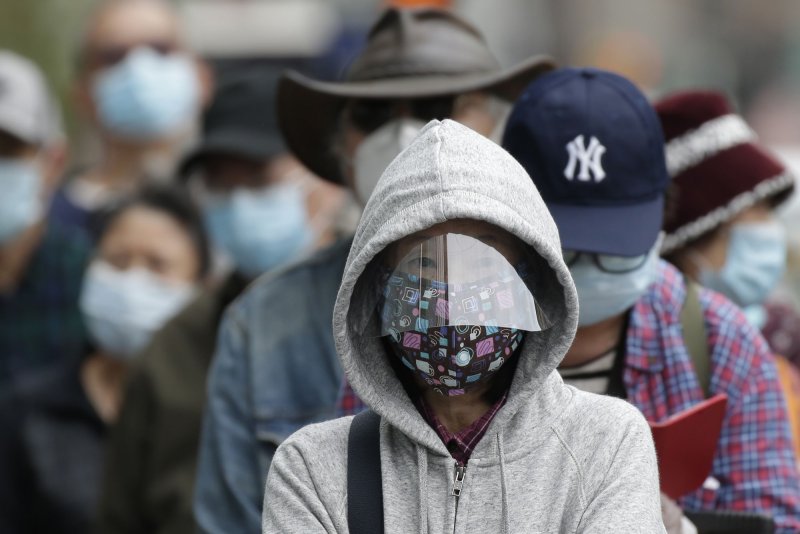TD Bank customers wear protective face masks as they wait in line to enter a Chinatown bank branch in New York City in May. Photo by John Angelillo/UPI |
License Photo
June 15 (UPI) -- As much as 22 percent of the global population -- or more than 1.7 billion people -- has an underlying health condition that places them at higher risk for serious illness from COVID-19, an analysis published Monday by The Lancet Global Health says.
The share of the population that health condition varies by age, from fewer than 5 percent of those under age 20 to more than 66 percent among those 70 years old and older, the researchers said.
Among the working age population -- aged 15 to 64 years -- 23 percent are estimated to have at least one underlying condition, they found.
"As countries move out of lockdown, governments are looking for ways to protect the most vulnerable from a virus that is still circulating," study co-author Andrew Clark, an assistant professor at the London School of Hygiene and Tropical Medicine in England, said in a statement.
"We hope our estimates will provide useful starting points for designing measures to protect those at increased risk of severe disease, [including] advising people with underlying conditions to adopt social distancing measures appropriate to their level of risk, or prioritizing them for vaccination in the future," Clark said.
Underlying health problems -- including diabetes, heart disease and high blood pressure -- have been linked with more severe illness with COVID-19 since the new coronavirus that causes it, SARS-CoV-2, first emerged in China late last year.
Up to 30 percent of Americans with chronic conditions have required hospitalization after being infected with COVID-19, researchers have reported.
Through May 30, among all confirmed COVID-19 cases nationally, the most common underlying health conditions were cardiovascular disease at 32 percent; diabetes, 30 percent, and chronic lung disease, 18 percent, according to data released Monday by the CDC.
Those with underlying conditions were six times more likely to be hospitalized and 12 times more likely to die from COVID-19, compared to those who were otherwise healthy, the agency found.
Using health data from 188 countries -- and estimates of disease prevalence data from the Global Burden of Diseases, Injuries and Risk Factors Study -- researchers say 349 million people have needed or will need to be hospitalized if they are infected with the new coronavirus, according to a modeling analysis conducted by the authors of the new Lancet report.
In general, countries and regions with younger populations have fewer people with at least one underlying health condition, while those with older populations have more people with at least one condition, the authors said.
For example, the proportion of the population with one or more health conditions ranges from 16 percent in Africa to 31 percent in Europe.
However, Clark cautioned that the evidence needs to be communicated carefully to avoid complacency about risk in Africa.
"The share of the population at increased risk of severe COVID-19 is generally lower in Africa than elsewhere due to much younger country populations, but a much higher proportion of severe cases could be fatal in Africa than elsewhere," he said.
In Africa, countries with the highest HIV/AIDS prevalence, such as Lesotho, have a greater proportion of people with an underlying condition than countries with lower prevalence, such as Niger, he said.















